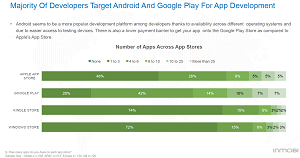News
Global Survey Sheds Light on Independent Mobile Developers, Who Much Prefer Android
- By David Ramel
- March 2, 2016
Another "State of ..." developer survey is out, but with a twist -- it's a global survey of more than 1,000 mobile app devs who mostly work by themselves or in very small shops.
The "State of Mobile App Developers 2016" report was published by Bangalore, India, company InMobi, which specializes in mobile advertising. It polled 1,089 developers residing in 155 countries, measuring developer mindshare, platforms of choice, revenue models, motivations and challenges, and ad monetization preferences.
However, unlike enterprise-oriented surveys, this one features a high number of independent developers, who constitute some 47 percent of respondents. Only 19 percent are in dev shops of more than six people. Also, there's a high representation (47 percent) from developers in the Asia-Pacific (APAC) region.
Among this group, Android is by far the most attractive platform target for their dev efforts (86 percent), far surpassing iOS (57 percent), though that difference is markedly less in the North America region, where the Android/iOS split is 81 percent and 71 percent, respectively (in Europe, it's 90 percent and 65 percent in favor of Android). Windows Phone is the platform of choice for 21 percent of polled developers, though it continually shows market share statistics of less than 3 percent. One interesting note about Windows Phone representation in the survey: It was cited as the No. 1 moneymaker for developers, on average. You can read more about this dubious finding in this blog post: "Is Windows Phone Poised for a Comeback?"
 [Click on image for larger view.]
It's an Android/iOS World (source: InMobi)
[Click on image for larger view.]
It's an Android/iOS World (source: InMobi)
Android also serves as a gateway to developers entering the mobile app arena. "Android is much more popular as an entry-level platform on which developers experiment or learn," the report said. "App developers who enter this business primarily adopt the Android OS as it is an open source platform and provides numerous functionalities and benefits for developers. Once they gain foothold, they start embracing other platforms."
Not surprisingly, Java is the most popular programming language (65 percent), followed by HTML5, JavaScript, Objective-C and C# in the top five. Apple's Swift language is coming on strong, though. "Swift is the programming language to watch for due to its rise in popularity in just one year of its introduction," the report said. "18 percent of mobile app developers use Swift, which is a remarkable number for a new language, a sign that Swift may succeed in attracting a much wider range of developers to build native iOS apps."
With much publicity in other surveys about the mobile developers falling below the "poverty line," the InMobi survey also concluded that "finding monetary success is still hard in [the] mobile app business."
The report states "55 percent of developer[s] make $1,000 per month; monthly average mobile app revenue globally is under $6K." The InMobi survey pretty much aligns with other similar surveys that indicate iOS provides the most revenue, while Android provides the most reach.
There were few regional differences among respondents' favored type of app. Across the board, the top three categories were games, entertainment and utilities.
Other survey highlights include:
- Marketing is the No. 1 challenge in the mobile app process (43 percent), followed by design (21 percent) and development (17 percent).
- Money is the No. 1 motivator for developing apps (34 percent), followed by fun (17 percent) and being creative/sense of self achievement (16 percent).
- Wearables are emerging as the next battleground for the developer platform wars. 32 percent of devs are more likely to build wearable apps in the future.
- Some 46 percent of respondents were between 25 and 34 years of age, with the average age computed to be 33.
- Only 6 percent of polled developers were female, though that percentage rose to 11 percent in North America.
"The mobile revolution and the surge in smart phone usage [are] driving the market for mobile applications," InMobi said. "Mobile app development is a prospering industry and is going to get bigger over time. The growth in consumer demand for mobile apps and their ever growing time spent on these apps is encouraging for both aspiring and seasoned developers to innovate across mobile devices.
"The speed at which the app industry continues to evolve, the tools and platforms available to build and monetize apps, is overwhelming for developers to build a sustainable business. This has opened up great opportunities for the app developers to launch their own entrepreneurial avenues, build great products and further scale their businesses. The market is massive and with huge competition the challenge for the app developers is to make sure that they are able to monetize these apps to fund innovation."
About the Author
David Ramel is an editor and writer at Converge 360.